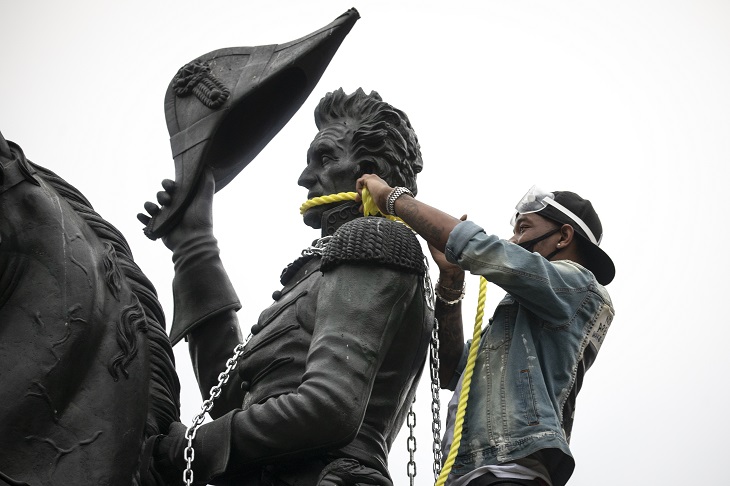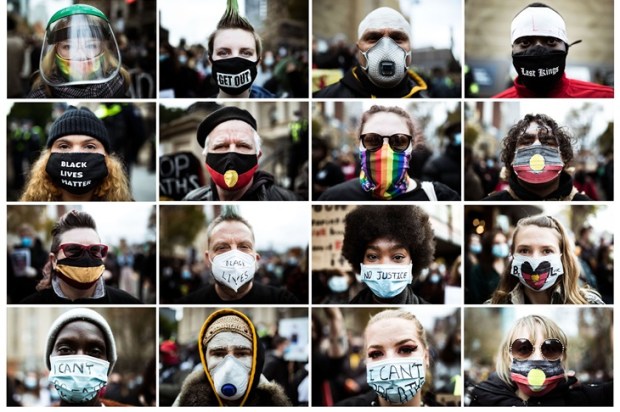History tells us that civilisations and empires are ephemeral. Like the Egyptian civilisation, they may last for thousands of years or, like the extensive Mongol Empire, be gone in less than 200 years.
Douglas Murray’s latest book The War on the West details the decline of our civilisation which found its origin in Greece, a thousand years before the birth of Christ. The establishment of the city of Rome in the Pontine Marshes led to Greece’s eventual downfall and the subsequent spread of Roman control from Britain in the North, through to North Africa and parts of the Middle East.
Its success was, in part, due to timing.
The increased temperature, known as the Roman warming period, produced an abundance of food which allowed time for infrastructure development, with roads, irrigation and sanitation, architecture, art, and sophisticated government. At its heart was a mighty, disciplined, military machine. Its subsequent decline has been explained by many developments: the change in climate led to increasing food shortages, Christianity undermined many of its cultural principles, corruption, and decadence set in, and then the Northern hordes invaded. Edward Gibbon, in his classic series of books, The Decline, and Fall of the Roman Empire, attributed the decline to ‘loss of civic virtue’.
After 500 years, the empire collapsed and the conquering tribes of Goths and Vandals sacked Rome. The Eastern half continued as the Byzantine Empire for another 500 years before it was overrun by the Ottoman Empire, which in turn lasted until the first world war. Rome left behind a legacy of languages with Latin as their origin in France, Spain, and Italy along with roads, water systems, and architecture much of which still survives to this day. Importantly, it also bequeathed the Greek concepts of democracy. Climate may have once again influenced the decay of civilisation, with the period of falling temperature known as the Dark Ages. Europe was overwhelmed by war, pestilence, and starvation.
Another period of climate change came along known as the Medieval Warming Period. It was associated with greater food production, allowing the resurrection of culture and learning during The Renaissance. Western culture was rediscovered, leading to an era of European world preeminence where empires were carved out, spreading to the Americas and to the East as far as China. With its early adoption of a democratic government, Britain managed to avoid much political turbulence which affected some European countries. Its early adoption of the industrial revolution and its investment in the world’s biggest navy allowed its Empire to spread; by the end of the 19th Century, it dominated world trade and finance. Subsequently, two world wars sapped European financial and physical strength, and then immigration undermined its social cohesion. The world’s power transferred to the Western-orientated America where it is starting to look increasingly shaky.
Jacob Bronowski, in his celebrated 1970’s series The Ascent of Man, discussed the evolution of art, science, and mankind; included in one chapter was a graph depicting the rise and fall of civilisations, with each following a predictable pattern of exponential rise, reaching a peak, followed by a catastrophic collapse to anarchy. The title of the series was based on one of Charles Darwin’s books, The Descent of Man, which described our origin from the apes.
Many historians have similarly commented on the transient nature of societies, there are increasing signs that our Western culture has reached a tipping point. Bronowski’s series documented the variety of empires that had fallen through war, disease, or decadence leading to civil war. There are disturbing signs that a ‘fifth column’ is already attempting to undermine the glue that holds our civilisation together religion, the family unit, tradition, and culture are all under attack; what used to be called moral turpitude has become acceptable, even encouraged.
These similar problems are widespread, with a comparable repetition occurring in America, Europe, UK and Australia. The pattern of behaviour was first described by American psychiatrist Elisabeth Kubler-Ross in relation to the grief surrounding death or loss. The stages of denial, anger, negotiation, depression, and acceptance are what many countries are going through as their former place in the world order fades. The UK is thought to be at stage five whereas America and Australia are still perhaps at stage three.
The Western canon has been based on Christianity, marriage, property rights, freedom of speech, and democracy; while its evolution has come from gradual changes in ethical standards. The abolition of slavery, improved women’s rights, sexual freedom, and removal of racial discrimination have evolved over the last 200 years in the West. With this evolution, the traditional influence of Christianity has fallen from 70 per cent to around 40 per cent, and the likelihood of couples marrying has fallen from 80 per cent to around 15 per cent. Douglas Murray, in his book The Slow Death of Europe, commented that, despite equality having been reached in all these areas, activism demands yet more changes, changes which are intended to undermine our culture. His latest book The War on the West describes the fifth column at work within our own society.
Included in these demands is the view that all past events should be seen through the prism of modern morality. In its extreme form, it implies that events and individuals who in the past did not fit those standards, should be judged by today’s standards and be ‘cancelled’. As with every Australia Day there are increasing demands for public debate about the National Day and the invasion that ensued.
This perpetual demand for apology has further undermined society’s ethos and its bedrock traditions. There is little recognition of the advantages of the Western lifestyle when compared with other cultures or systems of government; increasingly, multiculturalism suggests all other cultures are superior. As illegal immigration has rapidly altered the ethnic balance in Europe, so traditional values have been further undermined by a lack of assimilation.
Outside countries, courtesy of social media, have added fuel to the fire with fake news and fake outrage. Communist countries see the effectiveness of this self-destruction and use the West’s perceived weakness to accelerate their cause. Conspiracy theories undermine our faith in government and democracy, these techniques will only increase as intelligent technology makes the lies look more believable. Whilst the West engages in diplomacy, China has engaged in the take-over of Hong Kong and the South China Sea. Both are a result of the West’s inaction. The communist ‘partner in crime’, Russia, is in following the same path. Having succeeded in Crimea, it has moved on Ukraine and into Kazakhstan. At the other extreme, right-wing autocracies are also in ascendance in South America.
In Australia, the stolen generation enquiry exaggerated the scale and severity of maltreatment of the past era, whilst ignoring similar historical white-on-white maltreatment in institutions. Forced adoption was once considered normal practice for those born out of wedlock. This is no longer acceptable here, but in many countries to this day, a child born outside marriage can result in a death sentence for the mother. Two hundred years ago, Christian Europe was the first area to ban slavery. It persists in some countries, but it is only the West that is blamed, despite it being a global phenomenon.
The Black Lives Matter demonstrations resulted in the loss of many Black lives and businesses. Statistics do not confirm the claims of endemic racism or police brutality in Western Societies. The Marxist organisation promoting this agenda admits that the downfall of capitalist societies is its ultimate aim, and accusations of racism are its method.
Female emancipation was first introduced in the West, but it is still not accepted in Islamic law. The women’s rights movement has been hijacked by a ‘toxic masculinity’ agenda, and subsequently by transgender issues. Complaints about pay rates (mandated equal by law), promotion prospects, and workplace harassment encourage discontent. Sensational surveys are distorted to report widespread rape culture, with ubiquitous misogyny. Depiction of marriage as slavery and the rise of single parenting have produced increasingly dysfunctional family relationships, which undermine the traditional family unit which is the bedrock of our society. Increasingly, financial expectations result in both parents (if there are two) working and having less time to devote to their children.
Minority activism, supposedly based on equity, diversity, and inclusion, uses its agenda to prohibit any views it disapproves of. The increasing alphabet of sexual diversity promotes the demands of ever smaller groups, which must have priority over the majority heterosexuals. Dissent is met with character assassination, rather than debate; the law, and those who enforce it, are increasingly subjected to abuse. The decline of religion has resulted in its replacement by Climate Change, Black Lives Matter, and #MeToo pseudo-religions, while the advent of Covid has further interfered with normal relationships and accentuated extremist views.
The perpetual propaganda from social media is reinforced by an activist school curriculum where the young spend an increasing amount of screen time on unfiltered information. The cumulative effect of demands for apology serve to encourage negative self-worth and depression in students. Psychological problems, eating disorders, acopia, and suicide are on the rise while and the restrictions of Covid have proved insurmountable for some. Despite increasing funding for education, the standards of literacy continue to decline as the basics are ignored to concentrate on social commentary. A recent survey of adults in Tasmania showed that, despite 12 years schooling, 50 per cent were functionally illiterate.
On leaving school, young adults have a distorted idea of their worth and what society owes them; they are well aware of their rights but have no idea of responsibility. Their level of expectation means they expect equality of outcome rather than the equality of opportunity that they have ignored. They have no knowledge of history or the debt they owe to those who have lost their lives protecting their freedoms. A review of the Australian school curriculum revealled an absence of the Judeo-Christian ethos which had been replaced by critical race theory and victimhood. Former Premier Joan Kirner’s comments have come to pass, ‘Education has to be part of the socialist struggle, rather than an instrument of the capitalist system.’
This sense of entitlement, often associated with indolence, means an increasing number of citizens refuse simple jobs and plan for a life on welfare; they decline picking fruit or waiting on table, the start to developing a work ethic. The concept of the dole, originally a temporary support through hard times, is increasingly a multi-generational lifestyle choice. Martin Luther King once stated, ‘If a man doesn’t have a job or income, he has neither life, nor liberty, nor the pursuit of happiness. He merely exists.’ This increasingly leads to a life of dissatisfaction, drugs, crime, and jail.
At the other end of the age spectrum, the traditional obligation of caring for the rising number of old is increasingly abrogated to the State, absolving the family who complain when the care is inadequate. More people are taking from society and fewer contributing who remembers what JFK once stated, ‘It’s not what your country can do for you, it’s what you can do for your country.’
The current Covid pandemic has been used to suggest that capitalism is failing, that climate change is its result, and that the ‘great reset’ (code for wealth redistribution) is required. If this is the end of our civilisation, as previously suggested by Bronowski, the neo-Marxists believe that economic collapse will soon follow, but what alternatives could replace it? Certainly, the choices are not appealing/ Will we have to learn from the Koran or Das Kapital? Cantonese is currently looking a more likely option.
Dr Graham Pinn, FRCP, FRACP, FACTM, MRNZCGP, Retired Consultant Physician.
Got something to add? Join the discussion and comment below.
Get 10 issues for just $10
Subscribe to The Spectator Australia today for the next 10 magazine issues, plus full online access, for just $10.


























Comments
Don't miss out
Join the conversation with other Spectator Australia readers. Subscribe to leave a comment.
SUBSCRIBEAlready a subscriber? Log in